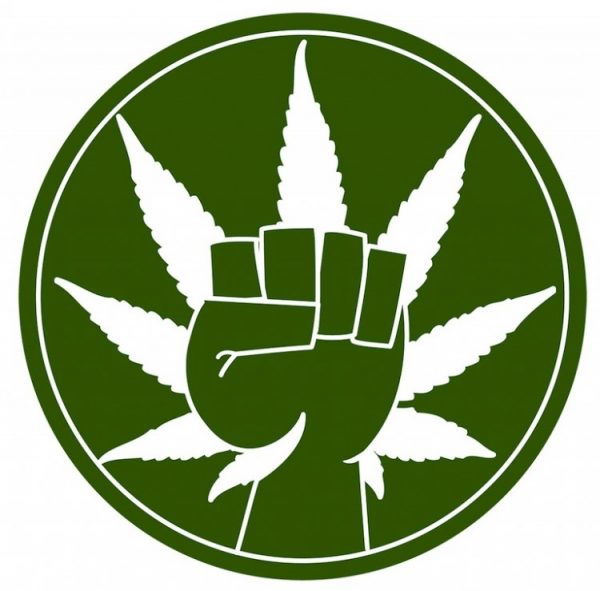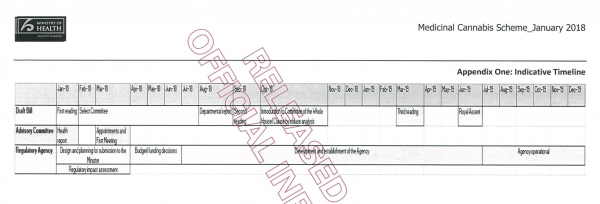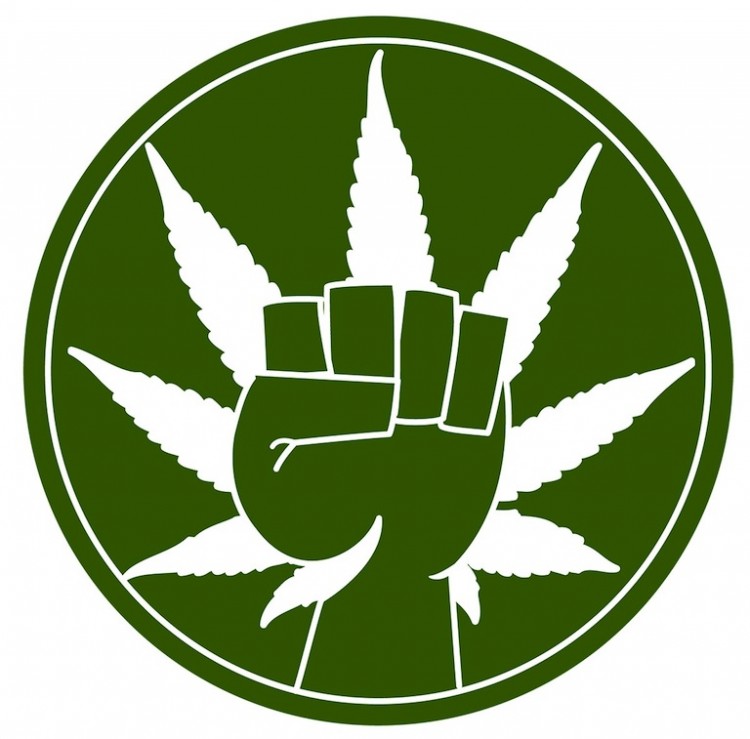
The Government’s Medicinal Cannabis Bill will take effect next year, a few months before the referendum on making cannabis legal.
The medicinal cannabis bill will be reported back from the health select committee in July.
But according to a timeline in the documents released under the Official Information Act, it will be another year before it takes effect.

Inexplicably, the bill is scheduled to be debated in Parliament this September, but they don’t vote on it until next March. It finally gets the Governor-General’s signature in June 2019. They can then start on the regulations for local production, so that will take another year.
It means patients who meet the Bill’s definition of being terminal – assessed by a doctor as having less than 12 months to live – will probably not be around to qualify for a statutory exemption allowing them to obtain, possess and use cannabis to ease their suffering.
As for the Bill itself, the Health committee may recommend changes, and any MP can propose amendments during that September debate in the House. They certainly need to.
The Bill was widely criticised as falling short on Labour’s election pledge to “legalise medicinal cannabis” for terminal conditions and chronic pain. It does three things:
- Deschedule cannabidiol (CBD), a non-psychoactive cannabinoid. A symbolic gesture more than anything else, as regulations were changed in 2017 to achieve much the same thing.
- Create a statutory exemption for terminal patients (only) against charges of obtaining, possessing or using cannabis. This was widely criticised for excluding patients suffering chronic pain (the documents show the Ministry of Health believed that would extend the defence to too many patients. They also believe the Police will bring forward prosecutions to test the exemption).
- Create a new regulation-making power to set production standards for cannabis-based medicines. The bill does not actually set those standards and it is unclear, from both public statements and the document stash, what they will be. It’s also unclear how any production will be licensed, given the Misuse of Drugs Act allows licences only for research or study.
That’s a lot of uncertainty to base an industry on.
Or to hope that it will make much difference if you are suffering and could benefit from cannabis now.
I think Labour know this. So they are offering a cannabis referendum as “part two”.
If it passes and any adult can grow their own cannabis, or perhaps buy it from a licensed store, there will be no need to put forward a liberal, US-style, medicinal cannabis scheme which they feel would inevitably be watered down.
Instead, they’ve put forward a conservative, Australian-style, scheme where the only pressure will be to make it better, not worse. And if Parliament doesn’t make it better, it will all be fixed by the referendum anyway.
The referendum was intended to be held at the same time as the next general election, in 2020.
In US states that have held cannabis ballots there has been an observable shift in voter turnout, of a few per cent, in the direction of leftwing and liberal candidates.
Enough to possibly make a difference in the next election. Enough for Winston to not want that.
That’s why, I suspect, NZ First are so keen on David Seymour’s euthanasia bill being tied to a referendum. That almost guarantees it will be tied in with the cannabis vote, and that it will not happen at the next general election. Because no politician would want that discussion happening when their job is up for renewal.
Hence, the talk of 2019, probably during the local body elections. That’s probably a good thing as it will help to take the politics out of the rational discussion this country needs to have.
But contrary to much of that talk, the referendum could still be binding. In fact, no decision has been made.
That flurry of media excitement came from one reporter asking the leaders of the governing parties and getting different answers.
The fact they all said different things was a big clue that no strategy on the referendum had been devised and no decision had been made.
I talked to Andrew Little, the minister in charge of the referendum, and said the two biggest issues that need to be resolved are linked: what should the question be, and should it be binding?
If the question is binding, it only needs to win by 50.1% which means the question can be bolder: making cannabis legal like Canada, Uruguay or nine US states. It also implies we will know exactly what we’re voting on, with a specific model put forward.
If the question is non-binding, it really needs to pass by 75% or more to give the Government the confidence and mandate to act decisively. That means the question put forward would be more conservative: perhaps Australian-style instant fines or some other mediocre compromise that will be utterly uninspiring.
The referendum could be multi-stage or have multiple questions. It could be first-past-the-post, or preferential. That’s because each government-initiated referendum is created from scratch with it’s own Bill. Almost all have been binding. All have involved a well-funded public campaign to inform discussion.
There was nothing in this year’s budget for the cannabis referendum. Anything in next year’s budget would only allow spending after 30 June 2019. That leaves maybe four months to work out the question and referendum structure, then plan, devise, and carry out a public information campaign.
It’s not really possible. Here’s a better way forward:
Any referendum bill will be heard by the Justice and Electoral committee, who have just decided to spend the next year travelling New Zealand to hear every submission on the euthanasia bill, an epic undertaking considering over 3000 submitters asked to be heard.
They could use the opportunity to take submissions on a cannabis referendum bill, and then recommend a question and structure. A bill has to be passed anyway to create the referendum – let’s use the select committee submission and hearings process to develop the question and format, and take the public with us.
So what’s the basic take-home of all this?
Nothing is certain. Anyone can still make a difference to both the medicinal cannabis bill, and the cannabis referendum.
Lobby MPs, particularly those on the health select committee, to extend the exemption to all patients, certainly those with “severe and debilitating” conditions, and to bring forward the timetable for establishing local production.
Lobby MPs, particularly those on the Justice and Electoral committee, who will be hearing any bill to create the cannabis referendum.
The lacklustre reaction to the medicinal cannabis bill, and it’s slow progress through Parliament, holds an important lesson for the cannabis referendum: If you want to make it legal, we need to make it binding.






Please recommend this docuseries to your MP – IMO, all of them are abysmally ignorant about the health value/benefits of cannabis.
In the 1st series: “The Sacred Plant”, is documented the wonderful work/use of cannabis in Israel, of all countries!! (Episode 1 is here:
https://www.youtube.com/watch?v=gqcDfyTnYA8 The Sacred Plant Secrets Exposed: Episode 1. Another episode is here:
https://www.youtube.com/watch?v=4tYBHAyHUN4 How People Are Reversing Autoimmune Diseases Naturally & another here:
https://www.youtube.com/watch?v=A7fVuRwjTdM Using The Sacred Plant to Treat Silent Killers with Dustin Sulak & still another one here:
https://www.youtube.com/watch?v=rJfbqZmcBuI How The Sacred Plant Helped Defy Terminal Cancer – Twice
Type “The Sacred Plant” in You Tube & all 7 episodes come up.
This video is also of meaningful interest:
https://www.youtube.com/watch?v=fu6FhJIyTEc The Scientist (2015) Medical Marijuana: Studying For a Higher Purpose – Prof. Dr. Raphael Mechoulam.
As a NZRN, I am certain that I would significantly benefit from being able to ingest raw cannabis leaves. In the 1st Sacred Plant series, people with MS found cannabis to be of great benefit. The pain I so often suddenly experience in all, but different, parts of my body, would at the least, lessen to a significant degree, & likely other symptoms too.
“The Season 2 world premiere of “The Sacred Plant: Healing Secrets Examined” airs online tomorrow night, Wednesday, June 20th at 9 p.m. U.S.Eastern.
“Episode 1 is titled “The Sacred Plant…Examined” and you do not want to miss it.
“You’ll meet several doctors and global health experts up close and personal who’ll share with you:
“How the endocannabinoid system works in tandem with cannabis and why it’s so important to our health
“NEW cutting edge advancements in medical cannabis research
“How the ‘Disinformation War’ has given cannabis a bad name and why it’s critical to know the truth
“And so much more
“You’ll also hear some incredible survivor stories including:
“A 4-time Grammy Award winning singer and cancer survivor uses The Sacred Plant instead of chemo.
“This father who was hooked on 34 addictive prescription pills a day now on ZERO pills
“A brave 2-year-old boy who beat terminal cancer twice…and the parents who fought doctors and the law to treat him with cannabis
You’ll hear how the sacred plant helped to heal and SAVE their lives.
“We would hate for you to miss out on Episode 1 and all the new insights and knowledge you’ll gain in helping to end suffering, pain, and disease for you or a loved one.
“All you have to do to watch is go here: https://two.thesacredplant.com/docuseries , to register to watch Episode 1 tomorrow night. You’ll also get access to watch the entire Season 2…all 7 episodes…for FREE.”
There is a lot of You Tube videos about cannabis; this one is very good:
https://www.youtube.com/watch?v=fu6FhJIyTEc The Scientist (2015) Medical Marijuana: Studying For a Higher Purpose – Prof. Dr. Raphael Mechoulam Please send this info to your MP too. All the MPs need to be VERY URGENTLY WOKEN UP re cannabis!
Good article.
Some suggestions for binding referendum
Question: “What is your preference for Cannabis use in NZ/A?”
a/ Prohibition (as in US Federal law)
b/ Prohibition (with approved exceptions for medical cannabis)
b/ Decriminalization (as in the Portuguese model)
c/ Legalization (as in US states: Colorado, California etc)
Each option would allow those who support them to make their case with all the evidence and hugely advance public debate.
Prohibitionists will come out with all the old crap. Mainly their use of “science” to prove that cannabis ‘abuse’ in youth can cause refer madness.
The big move towards decriminalization internationally is being driven by legalizing medical cannabis. NZ has taken the baby step of the current MC Bill but is at least going in the right direction.
The Decriminalization option has lots of evidence going for it over nearly 20 years. It dispenses with the bogus science behind prohibition. The problem is that it is a halfway house that substitutes ‘medicalization’ for ‘criminalization’. It shoots down the prohibitionists fears and fake data. However, it continues to claim that cannabis is harmful and that users need to be diverted from jails to clinics. But there is no need to medicalize it as harmful when the experience of medicalization is not that it is harmful but beneficial once the criminal stigma is removed (and even despite the stigma!).
The Legalization option obviously implies but also goes beyond decriminalization. We can prove scientifically that cannabis is only harmful because it is prohibited. We can also prove that decriminalization is insufficient to remove that harm of prohibition. Medicalization means that the user has to present for approved MC treatment for a medical condition, as defined by the Medical profession and state regulators, and does not allow for ‘self-medication’ and self-growing because of the continuing assumptions of harm, abuse and addiction. But ‘harm’, ‘abuse’ and ‘addiction’ are not medical problems. They are social problems. Recent research on addiction shows that it is learned social behavior which can be ‘unlearned’ given the right social conditions. Medicalization also ties MC up in licensed commercial production, most of which will be sooner or later monopolized by big state backed corporates.
The best scientific evidence that is now flowing out with the end of prohibition needs to be directed into the media and select committees, public debates etc. to make the referendum a measure of a relatively informed public opinion, rather than a public manipulated by moral panics, as bought media, and fake science.
I think there will be a worldwide approval for cannabis to be used for medicinal purposes…the Government is just stalling until the go date arrives. MONSANTO is our ruler and this demonic company will give the okay once all patents are secured.
Absolutely, get organised and get Big Pharma out of the equation. The government needs to grow a pair. I would just like to grow one plant for my personal use in my own back yard to cope with pain and mobility issues.
As I said in a comment on a previous article on TDB (I think also by Chris), a simpler 2-part question would be:
1) Should cannabis be legalized for non-commercial recreational use?
2) Should commercial sales of cannabis for recreational use be legal, regulated, and taxed?
As Chris says in this article, it would be a waste of a (hopefully binding) referendum to go for a timid medical-only legalization, a la California prior to the full legalization vote there. Especially since it seems like legislators will eventually get there on their own, by a thousand tiny steps, with or without a referendum.
The main problem with Dave’s 4 option question is, what if 40% vote for prohibition, and the 60% vote for law change is split between the other three options? If these 4 options are to be presented, it needs to be as two questions:
1) Should the legal status of cannabis be changed?
2) If so, should the new model be:
a/ Prohibition (with approved exceptions for medical cannabis)
b/ Decriminalization (as in the Portuguese model)
c/ Legalization (as in US states: Colorado, California etc)
Although I wouldn’t know what to choose for question #2, as I believe we need to decriminalize possession for personal use of all drugs (b), *and* I believe that we need to regulate and tax recreational sales of *some* drugs, including cannabis but also entheogens / psychedelics and MDMA (all much less dangerous to the user and to society than alcohol according to Nutt et al).
Danyl,
Yes that would work. But I don’t see the problem with Question 2.
A referendum can’t go into detail about the level of regulation and taxation. I personally support Carl Hart’s position of legalizing all drug use but that is not going to happen until we get all the myths debunked.
A majority for any of a/b/c/ would have to argue about delivery in submissions on legislation, assuming there is any.
If its a/ then I would argue for defining medical cannabis as widely as we can with a right to self-grow and self-medicate under doctors supervision.
if b/ I would argue for the widest form of decriminalization; no automatic medicalizing, removal of criminal history etc.
if c/ then I would argue legalization be regulated lightly, eg contest evidence that legalization increases risk on jobs, youth uptake, auto accidents etc. The evidence from Colorado all points to less risk. direction. Canada has just gone for legalization which includes grow- your-own.
If the referendum is nonbinding I will never vote again regardless of the result. Supposedly we live in a democratic country. How the government runs this referendum will show if this is true.
ardern has already said she will not be bound by any result – binding or non-binding..
so this is all just an exercise in auto-eroticism..
Cannabis is a proven cure or alleviation for a number of medical conditions.
Why are we allowing people to decide who can live or die.
Storm the Bastille!
Comments are closed.